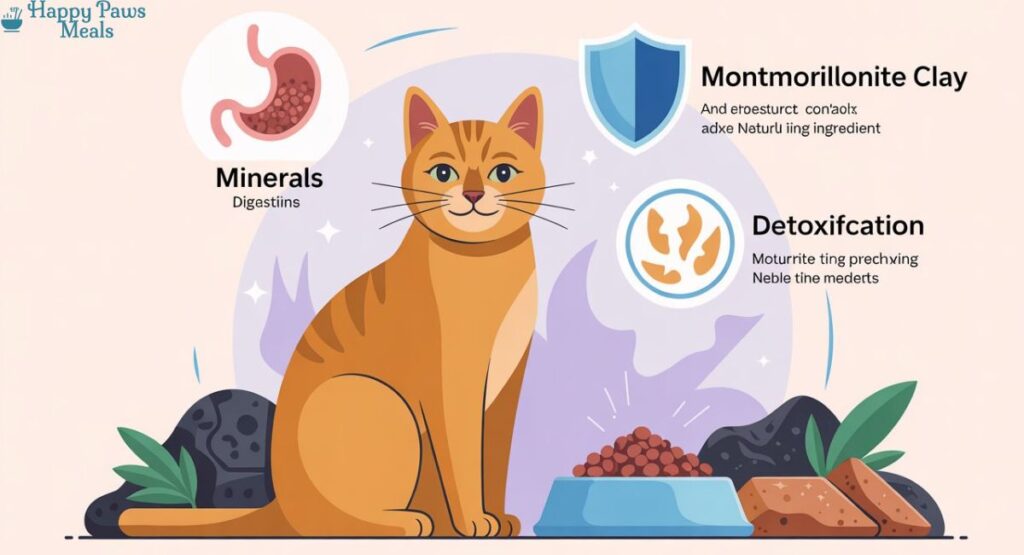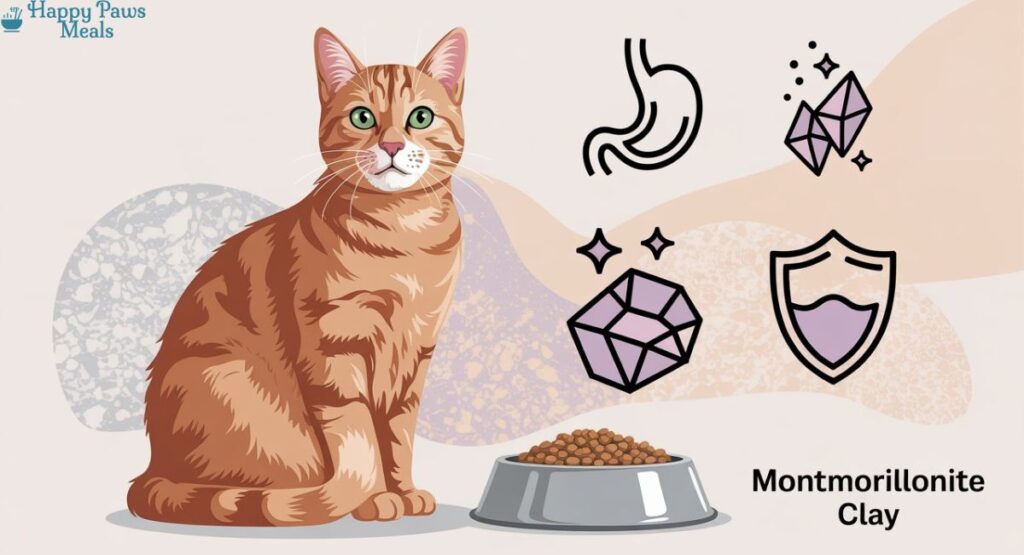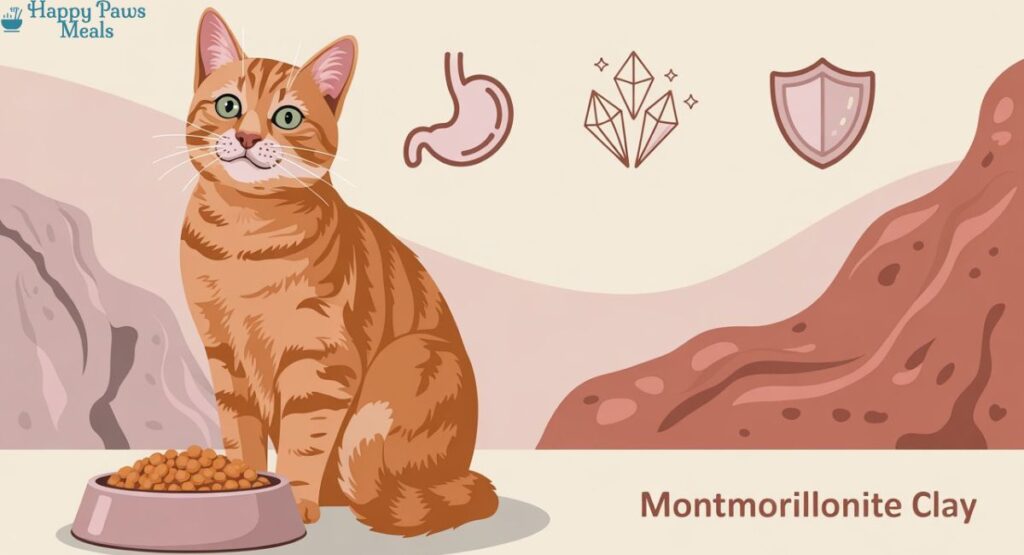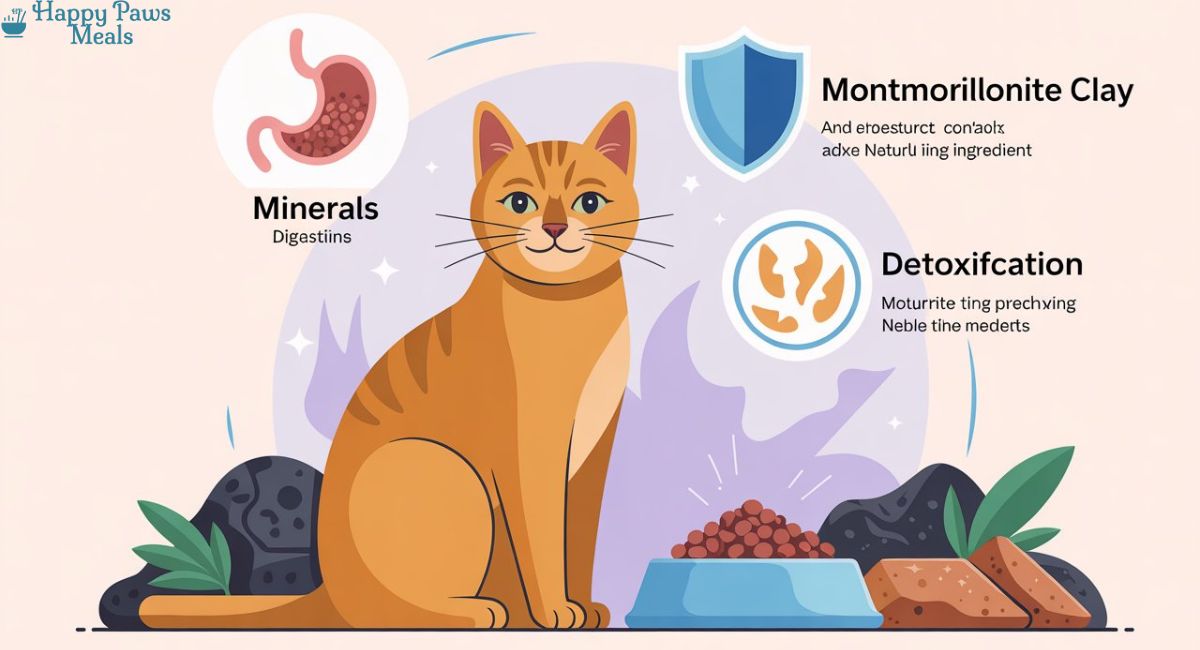Montmorillonite clay in cat food often surprises pet parents when they spot it on ingredient labels. At first glance, the idea of feeding your cat a type of mineral-rich clay may seem unusual. However, this natural ingredient has been safely used in pet nutrition for years, thanks to its digestive, detoxifying, and nutritional benefits.
In this guide, we’ll break down what montmorillonite clay is, why it’s added to cat food, its key health benefits, safety profile, and which popular cat food brands use it. Plus, we’ll answer the most common FAQs to help you decide if it’s right for your feline friend.
What is Montmorillonite Clay?
Montmorillonite clay—also known as bentonite clay—is a naturally occurring substance that forms when volcanic ash slowly weathers over time. This process creates a fine, soft clay that is packed with trace minerals such as calcium, magnesium, potassium, sodium, silica, and iron. These minerals are present in very small but important amounts, making them valuable for both human and animal nutrition.
Many premium brands now use montmorillonite clay in cat food not only as a source of trace minerals but also as a safe, natural way to support gut health and detoxification.

Because of its unique properties, montmorillonite clay has been used for centuries in health remedies, agriculture, and food preservation. In holistic health, it’s often praised as a natural detoxifier that can bind toxins and improve gut balance.
When it comes to pet food, montmorillonite clay plays two major roles:
1. Nutritional Support
- Supplies trace minerals that help maintain healthy bones, muscles, and nerves.
- Mimics the natural mineral intake cats might get in the wild when consuming prey.
- Supports overall metabolic functions and immunity.
2. Functional Ingredient
- Acts as a natural anti-caking agent, preventing kibble or powdered ingredients from clumping.
- Improves texture and consistency of food.
- Binds harmful toxins (like mold-based aflatoxins or heavy metals) in the digestive system, helping protect your cat’s gut health.
Benefits of Montmorillonite Clay in Cat Food
Montmorillonite clay may sound unusual at first, but its health-promoting properties make it a valuable addition to many premium cat foods. In pet nutrition, montmorillonite clay in cat food serves as both a nutritional booster and a functional ingredient. Here are the main benefits:
✅ Digestive Health
Montmorillonite clay helps absorb excess water in the gut, which can reduce diarrhea and improve stool consistency. Cats with sensitive stomachs or digestive upsets often benefit from diets containing this ingredient.
✅ Toxin Binding
Thanks to its natural adsorption properties, this clay can trap harmful substances such as toxins, bacteria, and even heavy metals. Once bound, these impurities pass safely through the digestive system instead of being absorbed into the bloodstream.
✅ Nutrient Boost
It delivers small but essential trace minerals like calcium, magnesium, and potassium—nutrients that support bone health, muscle activity, and overall cellular function.
✅ Natural Preservative
As a natural anti-caking and stabilizing agent, montmorillonite clay keeps kibble fresh and prevents clumping without relying on artificial chemicals. This aligns well with holistic and grain-free diets.
✅ Immune Support
By reducing the overall toxin load in the body, montmorillonite clay indirectly supports a healthier immune response, helping cats stay strong and resilient.
Is Montmorillonite Clay Safe for Cats?
Yes, montmorillonite clay is safe in regulated amounts. It is approved by the FDA as a food additive and has been used for years in both human supplements and pet food.
Safety Notes:
- Always rely on trusted brands that use regulated levels.
- Cats should not consume raw or unprocessed clay.
- Long-term use in food has shown no adverse side effects.
In fact, many holistic vets recommend foods containing montmorillonite clay for cats with sensitive stomachs.
Cat Food Brands That Use Montmorillonite Clay
Many premium cat food brands now include montmorillonite clay in their formulas—not as a filler, but as a functional ingredient that improves food quality and supports feline health. Its ability to stabilize kibble, bind toxins, and provide trace minerals makes it especially attractive for brands that focus on natural or holistic nutrition.

Premium brands such as Blue Buffalo, Orijen, and Wellness rely on montmorillonite clay in cat food for quality and safety. Some well-known examples include:
1. Blue Buffalo Cat Food
Blue Buffalo often incorporates montmorillonite clay in its grain-free and Wilderness formulas. It helps maintain kibble freshness while also supporting digestive balance in cats.
2. Orijen Cat Food
Orijen, known for its biologically appropriate diets, uses montmorillonite clay as a natural anti-caking agent. This aligns with their commitment to using safe, functional ingredients instead of synthetic additives.
3. Wellness Pet Food
Wellness Core and other lines frequently list montmorillonite clay among their ingredients. It plays a role in stool consistency and overall digestive health, making their recipes suitable for sensitive cats.
👉 While not every formula from these brands contains montmorillonite clay, its inclusion in many of their premium lines shows that it is trusted by top manufacturers as a safe, beneficial ingredient. Vets often recommend diets containing montmorillonite clay in cat food for cats with sensitive stomachs.
Comparison Table: Montmorillonite Clay in Cat Foods
| Brand | Role of Clay | Main Benefit for Cats |
|---|---|---|
| Blue Buffalo | Anti-caking agent | Supports healthy digestion |
| Orijen | Mineral enrichment | Adds natural trace minerals |
| Wellness | Preservative & binder | Improves kibble texture |
Should You Be Concerned?
Seeing “clay” on the label can sound odd, but montmorillonite clay is not a filler. It is included for nutritional and functional purposes, not as a cheap bulking ingredient. By lowering toxin load, montmorillonite clay in cat food indirectly strengthens the immune system.
If your cat suffers from diarrhea, loose stools, or food sensitivities, a diet that includes this clay might actually help. By delivering trace minerals, montmorillonite clay in cat food supports bone strength and muscle activity.

Frequently Asked Questions (FAQs)
1. Why is clay added to cat food?
It improves digestion, binds toxins, and prevents kibble from clumping.
2. Is montmorillonite clay toxic to cats?
No, it is considered safe and non-toxic in regulated amounts used in commercial cat food.
3. Does it act as a filler?
No, unlike fillers (corn, wheat, soy), montmorillonite clay has a specific function—nutritional and preservative. Including montmorillonite clay in cat food aligns with the growing demand for clean-label pet products.
4. Can I give my cat montmorillonite clay separately?
It’s best provided as part of balanced pet food. Do not give raw clay on your own.
5. Which brands use it?
Brands like Blue Buffalo, Orijen, and Wellness include it in some formulas.
6. Does it help with diarrhea?
Yes, many owners report firmer stools when switching to foods with montmorillonite clay.
Related Articles (Internal Links)
- Chewy Cat Food: Best Picks for Healthy & Happy Cats in 2026
- Top Online Cat Food Calculators
- Best Dry Cat Food for Cats in 2026
Final Thoughts
Montmorillonite clay in cat food isn’t something to worry about—it’s actually a sign of quality nutrition. It helps with digestion, detoxifies naturally, and provides valuable minerals. Far from being a filler, it’s a functional, health-boosting ingredient.
When choosing cat food, always go for trusted brands that list montmorillonite clay as part of a balanced, vet-approved recipe. Overall, montmorillonite clay in cat food is a natural, multi-benefit addition that keeps cats healthier and happier.

I’m Awais Manzoor, the writer behind HappyPawsMeals. With years of interest in pet care and nutrition, I research and review cat and dog food to provide reliable, easy-to-understand advice for pet parents.

